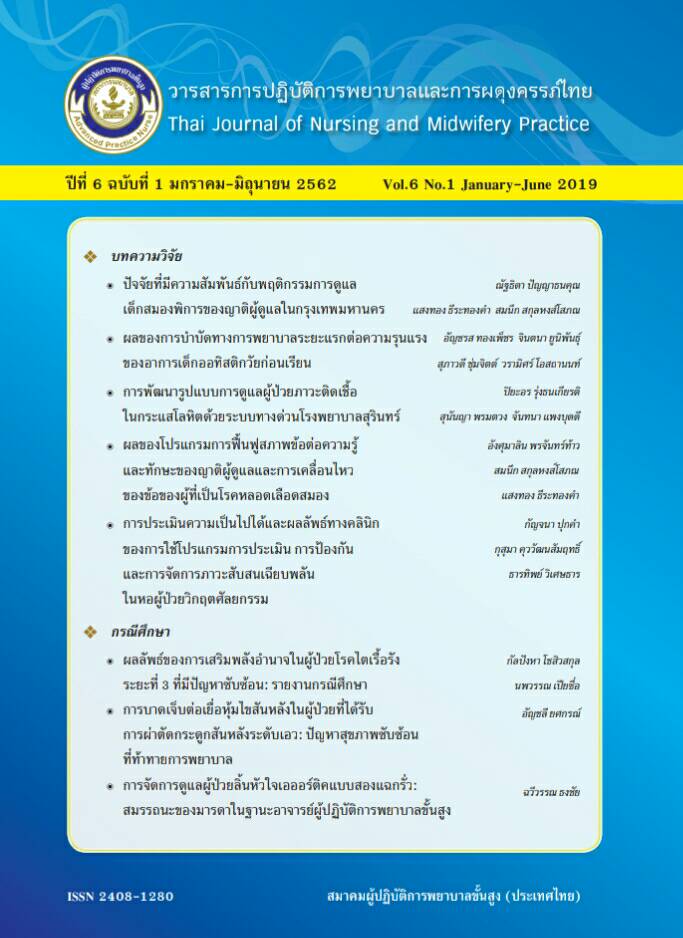Effects of Early Nursing Intervention on Symptom Severity of Preschool Children with Autism
Main Article Content
Abstract
Abstract: Symptom severity of children with autism has an impact on both the child and caregivers. This quasi-experimental research with the pretest-posttest control group design aimed to study the effect of early nursing intervention on symptom severity of preschool children with autism. The subjects were 30 out-patients preschool children with autism. The experimental group contained 15 children receiving early nursing intervention led by an advanced practice nurse. The other 15 children received usual nursing care. The early nursing intervention consisted of: play therapy, empowerment group, gross motor and fine motor developmental group, and individual telephone counseling which lasted for 4 weeks. The differences of the severity of autism spectrum disorders (ASD) symptoms before and after of the experimental and the control group were analyzed by using Wilcoxon Signed Rank test. The differences of the severity of ASD symptoms between the experimental- and the control group were analyzed by using Mann-Whitney U test. Results: Findings revealed that in the experimental group, the severity of ASD symptoms of all children was decreased statistically significant (p<.05), the differences of the severity of ASD symptoms scores before and after intervention in the experimental group were higher than in the control group. Findings suggest that early nursing intervention can be used to reduce the severity of ASD symptoms in preschool children with autism.
Downloads
Article Details
References
2. Atharia P, Ghaedia L, Kosnin AM. Mothers' depression and stress, severity of autism among children and family income. Int J Psychol Res 2013;6(2): 98-106.
3. Royeyers H, Warreyn P. Parenting in families with a child with autism spectrum disorder and a typically developing child: Mother's experiences and cognitions. Research in Autism Spectrum Disorders 2010;4:661-9.
4. Shields J. The NAS early bird programme: Partnership with parents in early intervention.
The National Autistic Society 2001;5:49-56.
5. Filipek PA, Accardo PJ, Ashwal S, Baranek GT, Cook EH, Dawson G, et al. Practice parameter: Screening and diagnosis of autism. Report of the Quality Standards Subcommittee of the American Academy of Neurology and the Child Neurology Society;2000:55.
6. Beurkens NM, Hobson JA, Hobson RP. Autism severity and qualities of parent-child relations. Journal of Autism and Developmental Disorders 2013;43: 168–78.
7. Talib TL. Relations between age, autism severity, behavioral treatment and the amount of time in regular education classrooms among students with autism (Order No. 3521871). 2012. Available from: ProQuest Dissertations & Theses Global.
8. Yunibhand J. Unit 8 Child and adolescent psychiatric nursing. Mental health and psychiatric nursing. Department of Nursing Science, Sukhothai Thammathirat University. Nonthaburi: Sukhothai Thammathirat University Press;2001. (In Thai)
9. Miller JF. Coping with chronic illness: Overcoming powerlessness. 2nd ed. Philadelphia, FA Davis;1992.
10. Beyer J, Gammeltoft L. Autism & Play. 2nd ed. London and Philadelphia: Jessica Kingsley Publisher:2001.
11. Gesell A, Ilg FL. Child development: An introduction to the study of human growth. New York: Harper;1949.
12. Glasser W. Station of the mind: New directions for reality therapy. New York: Harper & Row Pub;1981.
13. Polit DF, Beak CT. Nursing research: Principle and method. 7th ed. Philadelphia: Lippincott Williams & Wilkins;2004.
14. Eikeseth S, Klintwall L, Jahr E. Outcome for children with autism receiving early and intensive behavioral intervention in mainstream preschool and kindergarten settings. Research in Autism Spectrum Disorders 2012;6(2):829–35.
15, Rimland B, Edelson SM. Autism Treatment Evaluation Checklist. Available from: https://www.autism.com/atec/2000.
16. Muangmamanirat W. Relationship between selected factors social support and the ability to care for people who depending on of mothers of autistic children. [Master thesis of Nursing Science]. Department of Mental Health and Psychiatric Nursing, Chiang Mai University;2004. (In Thai)
17. Polit DF, Beck CT. Nursing research: Generating and assign evidence for nursing practice. 8th ed. Philadelphia: Lippincott;2008.
18. Chamchuri D, Yunibhand J. Research report of empowerment to manage illness of chronic disease of patients in the Thai social context. Bangkok: the Agricultural Co-operative Federation of Thailand;2002. (In Thai)
19, Buala S. The effect of playing therapy with family on Autism child behavior problems. [Master thesis]. Department of Mental Health and Psychiatric Nursing, Faculty of Nursing, Chulalongkorn University;2013. (In Thai)
20. Burns N, Grove SK. The practice of nursing research conduct, critique, and utilization. 5th ed. St. Louis, Elsevier Saunders;2005.
21. Roberts J, Williams K, Carter M, Evans D, Parmenter T, Silove N, et al. A randomised controlled trial of two early intervention programs for young children with autism: Centre-based with parent program and home-based. Research in Autism Spectrum Disorders .2011; 5(4) : 1553-1566.


